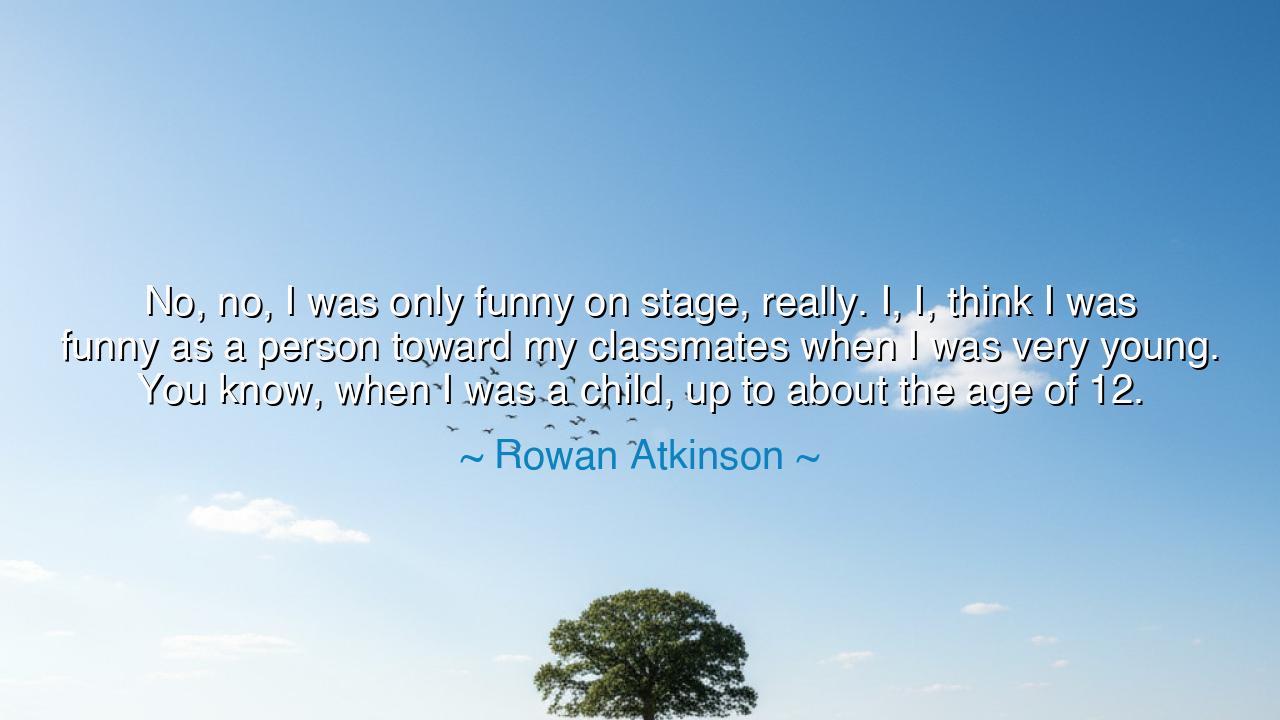
No, no, I was only funny on stage, really. I, I, think I was
No, no, I was only funny on stage, really. I, I, think I was funny as a person toward my classmates when I was very young. You know, when I was a child, up to about the age of 12.






“No, no, I was only funny on stage, really. I, I, think I was funny as a person toward my classmates when I was very young. You know, when I was a child, up to about the age of 12.” — Rowan Atkinson
Thus spoke Rowan Atkinson, the master of silence and laughter, the man who turned awkwardness into art. In this humble reflection, he reveals something that lies at the heart of every artist’s journey — the divide between the public self and the private self. He confesses that his genius for comedy was not born from a constant joy or ease in social life, but rather from a deep inwardness, a solitude that found expression only through performance. When he says, “I was only funny on stage,” he speaks to a profound truth: that the stage often becomes the place where the quiet soul can finally speak.
For Atkinson, the stage was not a mask — it was liberation. He, who was shy and introspective, found in humor the sacred alchemy that transforms self-consciousness into connection. As a boy, up to the age of twelve, he was playful, carefree, still unburdened by the weight of awareness that adulthood brings. But beyond that tender age, he grew inward, as many sensitive spirits do. Yet rather than letting that shyness imprison him, he transmuted it into art. His characters — from the silent Mr. Bean to the bombastic Blackadder — became vessels for what he could not express in ordinary life. Through them, he spoke the language of human folly in gestures and glances, a language older than words themselves.
There is an ancient resonance in this — for even the great tragedians and jesters of old lived with the same paradox. The Greek comic playwright Aristophanes, whose biting humor could move entire cities to laughter, was known for his solemn nature in private. Charlie Chaplin, that eternal child of cinema, who made the world laugh through silent tears, was himself a man of great melancholy. The artist of laughter often bears within him the shadow of silence. He laughs not because life is easy, but because he has felt its weight and chooses to lift it, even for a moment, through art.
Atkinson’s words also remind us of the fragile innocence of youth — those early years when one’s laughter is pure, uncalculated, effortless. The child finds humor simply because the world is wondrous; he laughs not to impress but to connect. Yet as we grow, self-awareness deepens, and we begin to question our place in the world. Many lose that childlike spontaneity forever. But Atkinson found a way to reclaim it — not in daily life, but on the stage, where he could once again be free, unguarded, foolish, and brilliant. In this sense, every performance of his is a return to that inner child who once made his classmates laugh.
There is a lesson here for all who feel divided between who they are and who they appear to be. Creativity often blooms not in those who are confident, but in those who feel different — who must build worlds in which they can belong. Atkinson’s confession is not of weakness but of mastery. He shows us that the shy may become the boldest storytellers, that the quietest may command the loudest laughter. What matters is not how freely one speaks in daily life, but how truthfully one expresses what dwells within. The stage, whatever form it takes — a canvas, a book, a dream — is where the soul declares its freedom.
Consider Emily Dickinson, who lived in solitude but wrote poetry that touched eternity. Like Atkinson, she was “funny on the page,” not in person; she expressed in art what she could not in conversation. Both teach us that one need not be loud to be powerful. One’s truest self often speaks in the stillness between words — in the creation that bridges the unseen world within and the visible world without.
Practical counsel for the seeker:
-
Cherish your quietness; it is the soil from which deep creativity grows.
-
Do not compare your inner self to others’ outer selves — each heart has its own stage.
-
Reconnect with the child within you, the one who laughs freely and without judgment.
-
And above all, find your own way to speak — whether in words, gestures, music, or silence — for authenticity is the truest form of artistry.
For as Rowan Atkinson teaches, not all who make others laugh are born of lightness — some are born of silence, and their laughter is a triumph over it. To be funny only “on stage” is not a flaw but a form of truth. The stage — whether literal or metaphorical — is where the shy soul finds its strength, where the heart that trembled in life becomes radiant in art. And when such a soul performs, the laughter it brings is not mere amusement — it is the sound of freedom.






AAdministratorAdministrator
Welcome, honored guests. Please leave a comment, we will respond soon